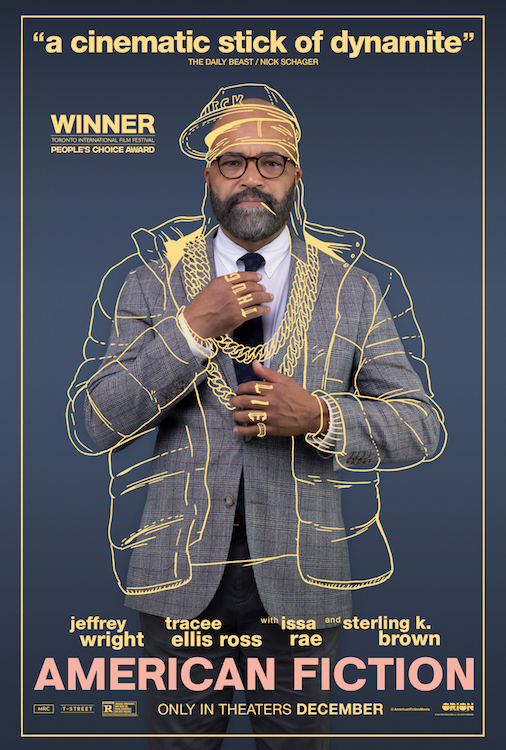Whip-smart and blisteringly funny, American Fiction is a late-in-the-year treat. Not only does it give Jeffrey Wright one of the best roles of his storied career, but it also announces a new cinematic voice in writer/director Cord Jefferson.
Wright stars as Thelonious “Monk” Ellison, an English professor and a writer of critically acclaimed but low-selling book. Monk’s in a bad place at the beginning of the film; he’s on leave from his job after berating a student, and his latest book is being rejected by publishers as not being “Black enough.” This rightfully bothers Ellison, because he’s writing books based on his own experiences, and yet he has to watch as white publishers flock to stories of the “authentic Black experience,” which only exploit misery and further stereotypes. When Monk suffers one too many setbacks, he lashes out in the way only a writer can – by writing his own exploitative, stereotypical novel as a joke. The book, of course, becomes a runaway best-seller, and Monk soon finds himself trying to balance his out-of-control secret while also dealing with family drama.
Wright has long been one of our most reliable and consistent screen presences, but he’s often relegated only to supporting status. As Monk, he gets to chew into the type of leading role he’s deserved for a long time, playing a flawed man whose anger is justified but also often misapplied. Monk is the smartest man in his family and usually in the entire room, but he’s also a character who knows it, and has cultivated a smug persona that pushes others away. This has caused distance with his brother (Sterling K. Brown) and his sister (Tracee Ellis Ross), and it isolates him from relationships with others. It’s a strong performance, often deeply funny and sad at the same time, and it’s some of the best work in Wright’s career.
Jefferson, adapting the Percival Everett novel Erasure, has great fun lampooning white liberal guilt, and his script saves its sharpest barbs for the well-intentioned but shallow men and women in publishing and Hollywood eager to capitalize on what they perceive to be the Black experience but who are really trying to assuage their own guilty consciences and are led by their own assumptions and prejudices. They only accept a narrative as appropriately Black if it has stories of drugs, deadbeat dads, crime, and suffering; in their desire to erase their own racism, they further stereotypes. Meanwhile, writers like Monk, who tell stories based on their lived experiences, are deemed uninteresting and inauthentic.
The film is very effective when dealing with this, whether through imagining Monk’s story coming to life before him as he writes (in scenes featuring a very funny Keith David), and benefits from strong performances by John Ortiz as Monk’s exasperated but opportunistic editor and Michael Cyril Creighton as the publisher so eager to have a hot new Black author that he accepts every suggestion Wright tosses out as a joke, no matter how ill-advised (including the title of his new book, which can’t be printed in a family review). And Adam Brody gets big laughs as a Hollywood producer eager to exploit the situation in the name of authenticity.

Tracee Ellis Ross and Leslie Uggams in “American Fiction.” © Photo credit: Claire Folger © 2023 Orion Releasing LLC. All Rights Reserved.
American Fiction is smart and biting about racial identity and white liberal guilt in the modern day, but its biggest success might be the way Jefferson also finds a way to tell Monk’s story about a Black family without the stereotypical trappings. As his book is spiraling out of his control, Monk’s family is going through several crises. As outlandish as the satire of the publishing industry is, Monk’s family feels authentic and heartfelt. Wright and Ross create a strong sibling chemistry, and Sterling K. Brown is very funny as Monk’s newly out-of-the-closet brother. And there’s even a sweet romance for Wright to play opposite Erika Alexander. Even as the film pokes fun at what American culture’s idea of an “authentic” Black story might be, it showcases one that is funny, warm and heartfelt.
American Fiction, unfortunately, loses its thread in its final act, settling to go out with a joke instead of reconciling its two story arcs and finding a satisfying end for Monk’s dilemma. A bit more time and focus to stick the landing might have made this one of the year’s top 10 films. But as it is, American Fiction is a funny and smart debut for Jefferson and a fantastic showcase for Wright’s talents.

| Producer: | Ben LeClair, Nikos Karamigios, Cord Jefferson, Jermaine Johnson |
| Release Date: | December 22, 2023 |
| Running Time: | 117 minutes |
| Starring: | Jeffrey Wright, Tracee Ellis Ross, John Ortiz, Erika Alexander, Leslie Uggams, Adam Brody, Issa Rae, Sterling K. Brown, Elle Sciore, Miriam Shor, Myra Lucretia Taylor, Keith David |
| User Rating: | |
| Writer: | Cord Jefferson |
| MPAA Rating: | R (for language throughout, some drug use, sexual references, and brief violence) |
| Director: | Cord Jefferson |
| Distributor: | Metro-Goldwyn-Mayer |
| External Info: | Instagram / #AmericanFiction |

